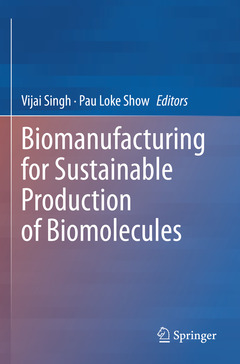Description
Biomanufacturing for Sustainable Production of Biomolecules, 1st ed. 2023
Coordinators: Singh Vijai, Show Pau Loke
Language: English
Subjects for Biomanufacturing for Sustainable Production of Biomolecules:
Publication date: 01-2024
359 p. · 15.5x23.5 cm · Paperback
Publication date: 01-2023
359 p. · 15.5x23.5 cm · Hardback
Description
/li>Contents
/li>Biography
/li>Comment
/li>
This book elucidates the sustainable production of commercially important biomolecules in medicines, food, and beverage processing, through biological systems, including microorganisms, animal cells, plant cells, tissues, enzymes, and in vitro. It discusses promising technologies for the manipulation of cells including, genetic engineering, synthetic biology, genome editing, and metabolic engineering. The initial chapters of the book introduce topics on biomanufacturing, circular economy, strain design and improvement, upstream and downstream processing. The subsequent chapters cover artificial intelligence-assisted production, designer cell factories, biosensors for monitoring biomolecules, different cells factories, biosynthetic pathways, and genome editing approaches for scale-up biomanufacturing. Lastly, the book discusses the opportunities and challenges of implementing biological systems for the production of biomolecules.
?This book is a valuable source for students, researchers, scientists, clinicians, stakeholders, policymakers, and practitioners to understand biomanufacturing for the sustainable production of biomolecules.
Dr. Vijai Singh is an Associate Professor and Dean (Research and Innovation) in the Department of Biosciences, School of Science at Indrashil University, Rajpur, Mehsana, Gujarat, India. He was an Assistant Professor in the Department of Biological Sciences and Biotechnology at Institute of Advanced Research, Gandhinagar, India and also an Assistant Professor in the Department of Biotechnology at the Invertis University, Bareilly, India. Prior to that, he was a Postdoctoral Fellow in the Synthetic Biology Group at the Institute of Systems and Synthetic Biology, Paris, France and School of Energy & Chemical Engineering at the Ulsan National Institute of Science and Technology, Ulsan, South Korea. He received his Ph.D. in Biotechnology (2009) from the National Bureau of Fish Genetic Resources, Uttar Pradesh Technical University, Lucknow, India. During his PhD, he has cloned, expressed and characterized hemolysin from Aeromonas hydrophila in Escherichia coli. He has extensive experience in MAGE, small regulatory RNAs, pathway designing, CRISPR-Cas systems, and microfluidics. His research interests are focused on building novel biosynthetic pathways for production of medically and industrially important biomolecules. Additionally, his laboratory is working on CRISPR-Cas9 tools for genome editing. He has more than 10 years of research and teaching experience in synthetic biology, metabolic engineering, microbiology, and industrial microbiology. He has published more than 80 research articles, 51 book chapters, 16 books and 4 patents. He serves as an associate editor, editorial board member and reviewer of a number of peer-reviewed journals. He is also a member of the Board of Study and Academic Council of Indrashil University and is the Member Secretary of Institutional Biosafety Committee (IBSC) in the same University.
Prof. Ir. Ts. Dr. Pau-Loke Show is founder and the former President of International BioprocessingSo
These books may interest you

Biomanufacturing 126.59 €



